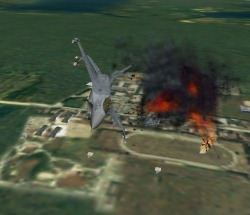| Patches and Paradigms: The Changing Reality of Game Development and Distribution by Mark Doran with Leonard Hjalmarson |
||||
|
It's another Satuday in March, 2000. Y2K panic has come and gone, with some serious ripples in the power grid, some pain in the financial community and a few other related problems all but resolved. You sit down at your 800MHz Pentium IV machine for some serious gaming in Falcon 5.2 under WIN2000. Today you are flying online with a naval MiG 29 squadron from North Korea against an F18 squadron based in Seoul. But as you check your email you discover that the version 5.3 upgrade has now been released, with support for DirectX 7.5. Er.. did I say "upgrade" and not "patch?" The Times They Are A'Changin' Our friend the internet changes everything (well, many things), not the least of which is our hobby. Yes, there are still those who don't have access or those who have access but still consider anything but email a black hole. But, increasingly, the Internet is ever more pervasive and that trend is likely to continue. The subject is patches, so why are we talking about the Internet? Because the retail channel for software, especially the kind of specialty games that the middle to hard core sim types really go for, is going to shrivel up and die before very long. And what that means is that the distribution means go elsewhere, or these games will cease to be produced. Enter the Internet and a new paradigm for distribution AND for development. This change in distribution paradigm (bear in mind this is speculative, but based on the following quotation from Gilman Louie you can see where I am coming from) will affect how the business models for things like gaming software will work through the entire product lifecycle. For the serious simulation gamer, these changes will hold some interesting possibilites. Let's listen to Gilman:
Louie says that for the first 90 days after the game's release, the Falcon 4.0 team will turn its attention toward add-ons and enhancements that will be available for download at the game's official web site . . . And the rest, as they say, "is history." Gamers have indeed let Microprose know "what is ready," which wasn't a whole lot. Unfortunately, MPS was not able to turn their attention immediately to add-ons and enhancements. |
 In spite of that, however, the enhancements are already in process. And the beginnings of a new paradigm are already glimmering like diamonds beneath a full moon. Initially Dan Bennett seems prophetic. MPS may have created a new artificial life form, or merely a Frankenstein with radar and a nice paint job. It certainly seems easier to rationalize an unending stream of patches. But we need to dig deeper. What is happening benearth the surface, and where is it all going? A Mining We Will Go! Consider the online "housefan" games. In large part, their success depends upon a dedicated crowd that will download 12-15MB of game to play exclusively online. If you're willing to download the whole game, what's a patch or two among friends? Programs have been written for Windows that checks automatically for the availability of new drivers for your system and then installs them almost automatically. Remember the auto web-update patch for Total Air War? DiD may have jumped the gun with their technology, but this move is inevitable. And if it's as easy as that why wouldn't this method become standard fare? By "easy" I mean a couple of things: First, it's a near "push" update process. Consider an online game that, as part of the "login" sequence, always checks and offers you the chance to upgrade to the latest patch. Consider an offline game, even, that can tell if you have an Internet connection and can thus make the same offer. Easy stuff, and easy means a smaller support budget and happier gamers. Second, I just got a cable modem (lucky me :-) and now the thought of downloading the entire F4 CD, all 600MB of it, doesn't hold much terror any more. And this is just the beginning for pipe bandwidth into the typical home -- this will continue to grow proportionately faster than game size for quite some time (based on subjective views of when CD games arrived versus how fast we've gone from 14k4 to 56k modems up through cable and DSL modems. Marketeers take note: I'd personally rather download a game while I do something else than sit in traffic on I-5 on a Saturday to obtain the latest title at EB or Circuit City.) So distributing whole games through the Internet is likely to become the norm. Because of easing bandwidth considerations and the explosion of effective e-commerce solutions for takin' the money (I haven't bought a computer part locally that's more expensive than a cable in nearly 9 months -- and I buy a *lot* of computer parts ;-) it's much easier. For specialty games like sims, the Internet works just as well for reaching the core audience, probably even better than retail. And it's a heck of a lot cheaper to do this "soft-distribution" than to cut gold master CDs and make cardboard, paper and cellophane. Yes, the marketing types are going to have to figure out how to grab the attention of the buyer who hitherto has picked up a copy on the shelf at the local software rip-off emporium. Go to Page Two |
|||
|
© 1997 - 2000 COMBATSIM.COM, INC. All Rights Reserved Last Updated March 22nd, 1999 |
||||

